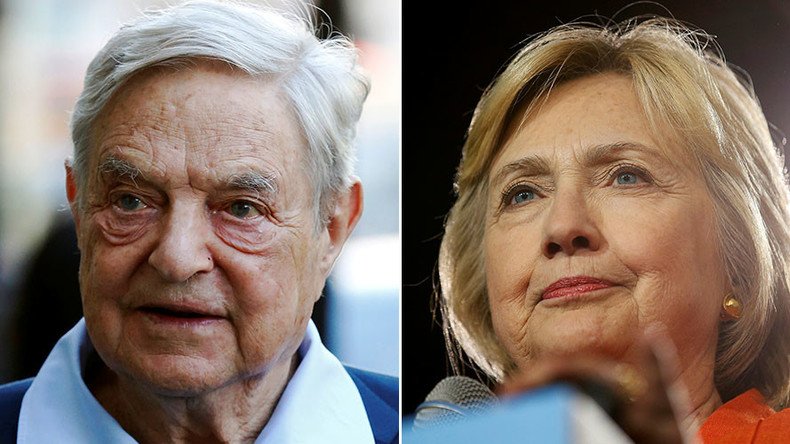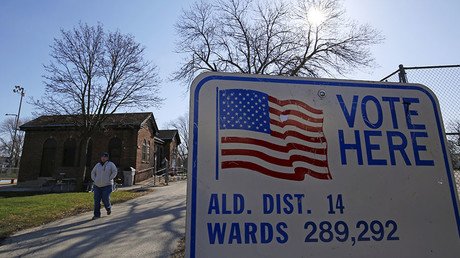Soros-funded DNC ‘superlawyer’ challenges voter ID laws to ‘protect the Obama coalition’

The Democratic Party is fighting to protect what it calls the “Obama coalition” of African-Americans, Latinos, and young people by trying to overturn certain voter legislation, with the help of billionaire George Soros.
Marc Elias, described by the Washington Post (WAPO) as a “Democratic superlawyer,” has been bringing a number of cases to battleground states where Republicans have tweaked laws to supposedly work in their favor.
For the 2016 election, 15 states introduced new voting restrictions, ranging from strict photo ID requirements to early and same-day voting limits.
UPDATE: Now 15 states with new voting restrictions in place for 1st time in a prez election: https://t.co/w2gSuIFCGqpic.twitter.com/qWAyNbRbwH
— Brennan Center (@BrennanCenter) August 2, 2016
At the same time, however, both Democrats and Republicans continue to oppose laws that could reform the system and open it up to more independents and candidates from other parties.
Elias, who rose to prominence in 2008 representing Minnesota Senator Al Franken in a recount which lasted eight months, approached Soros with proposals to challenge voting restrictions in states around the country, WAPO reports.
“You can bet your very last dollar that George Soros is not in the least concerned with justice or equality. This... https://t.co/g161KqKbIt
— Conservative Chick (@NaughtyBeyotch) August 8, 2016
The pro-Democrat Soros invested $5 million to protect the party’s “diverse” range of voters, according to WAPO.
While various civil rights groups have been challenging laws across the country, some of which Elias has joined, he has also brought cases in Ohio, Arizona, Virginia, Wisconsin and North Carolina, and a challenge in Phoenix in September.
“We’re challenging the laws in the states in which we have the greatest concern,” he said, adding that he doesn’t “think people should think we’re done filing lawsuits for this election cycle.”
8 million Latino voters are vulnerable to laws that restrict voting. Protect all voters! #VRAchatpic.twitter.com/2aZ88zkCxj
— NALEO (@NALEO) August 5, 2016
Elias works with law firm Perkins Coie, which represents numerous wings of the Democratic Party, as well as its governors, almost all of its members of Congress, and the DNC’s presidential nominee, Hillary Clinton.
While the NAACP Legal Defense and Educational Fund acknowledge the impact lawyers such as Elias make, they are conscious of the civil rights groups now being “dismissed as partisan” after spending years protecting minority voting rights.
Birmingham NAACP to offer free, non-partisan rides to the polls on Super Tuesday https://t.co/t5fQvTbiENpic.twitter.com/jtuaIgRzY8
— WBRC FOX6 News (@WBRCnews) February 27, 2016
Although Elias has explained that “regardless of who the plaintiff is, protecting civil rights ought to be something that we all strive to do,” he is, as his firm’s client choice would reflect, largely targeting states which will help bolster the Democratic Party vote.
Thanks! https://t.co/o7Hkbqbgv4
— Marc E. Elias (@marceelias) August 8, 2016
For those 43 percent of Americans who do not align themselves with the two leading parties, their alternatives are extremely limited thanks to long-standing legislation that restricts ballot access for Libertarian, Green, independents, and other “third parties.”
@RyJamesG@DanRiehl
— Steve S (@Dngrmse2001S) August 8, 2016
don't worry. George Soros is probably already directing his army of lawyers to file suits to get him on state ballots.
Numerous states have laws in place which favor Democrats and Republicans such as Pennsylvania where, based on a 1971 statute, candidates must collect between 20,000 and 70,000 signatures to gain access to the ballot, compared to just 2,000 needed for Democrats and Republicans.
Similarly, Florida requires an independent presidential candidate to have 110,000 signatures by early July to ensure they’re on the ballot for the November election.
FairVote notes that Texas has some of toughest laws against ‘third’ parties, where independents must gather signatures equal to 1 percent of the turnout in the previous presidential contest.
Voting restrictions disenfranchise people of color, the poor, young people & the disabled. These laws are modern day poll taxes. #VRAChat
— Rep. Barbara Lee (@RepBarbaraLee) August 5, 2016
Not only are “superlawyers” such as Elias not working to change these “undemocratic” requirements, but the party has actively opposed those candidates for years.
Following their “loss” in the 2000 campaign, the Democratic Party lodged 29 complaints in 19 states against Green Party nominee Ralph Nader during the 2004 campaign, all aiming to have him removed from the ballot.
In Pennsylvania, it was successfully argued in court that more than 30,000 signatures on his nomination papers should be scrapped on such ‘technicalities’ as using a nickname such as ‘Bill’ instead of the formal name ‘William,’according to Oliver Hall, Nader’s attorney.
In July, a federal court ruled that the number of signatures needed by third-party candidates to make it onto the ballot in the Keystone State be reduced from 21,000 to 5,000, which the Libertarians, Greens and Constitution Party were able to achieve.
Smaller parties can also get stuck with expensive legal bills if challenges against them are successful, such as the case with Nader in 2004 who had to pay off almost $82,000 without the help of billionaire donors such as Soros.
“Nader thus became the first candidate in American history to be penalized financially by a state for attempting to run for public office,” Hall says.
A similar fate befell the Pennsylvania Green Party in 2006 when Carl Romanelli ran for the US Senate. Needing 67,000 signatures, he gathered more than 100,000, only to be successfully challenged and left with an $89,000 legal bill.
It’s a frustrating process repeated almost every election cycle, since parties often need to achieve a certain percentage of the vote to remain on the ballot for the next time, something the Green Party has shadowing over them in Texas.
Ballot access isn’t the only barrier preventing independents and ‘third’ party candidates from making an impact in the presidential election.
Most states distribute their electoral votes on a winner-take-all basis, making it nearly impossible for smaller parties to garner support when the major two have so much influence and support.
After the 2013 Shelby ruling, new discriminatory voting laws immediately passed. We can't stay silent. #VRAchatpic.twitter.com/nQEiTiyiku
— NAACP (@NAACP) August 5, 2016
Efforts to counter the ‘spoiler’ system with methods such as Instant Runoff Voting (IRV) or Ranked Choice Voting (RCV), in which candidates can be ranked in order of preference, have been implemented in a number of cities like San Francisco, Oakland, and Minneapolis, and one state (North Carolina).
San Fran’s RCV law was unsuccessfully challenged in court by activists from both major parties, even though it can increase the kind of diversity the Democratic party allegedly supports.
Sixteen of the 18 offices chosen through IRV during the 2012 SF election went to candidates of color, including those who were outspent.
They literally STUDIED how black people vote, and created laws to suppress those voting efforts. Amazing. https://t.co/mvSOOxjCSJ
— Reagan Gomez (@ReaganGomez) July 30, 2016
California's Proposition 14, which had support from prominent Republicans and Democrats, lumps all candidates together in one primary with the top two meeting in a runoff.
Passed by voters in 2010, it is now in effect and two Democrats, Congresswoman Loretta Sanchez and California Attorney General Kamala Harris, are vying for the open US Senate seat.
There are currently RCV bills in 13 states, as tracked by FairVote.
On the federal level, IRV and RCV have been less successful.
The 2005 Voter Choice bill in Congress sponsored by Georgia Democrat Cynthia McKinney failed to get support from either of the main parties, leading her to abandon her party and run for president in 2008 as a Green.













